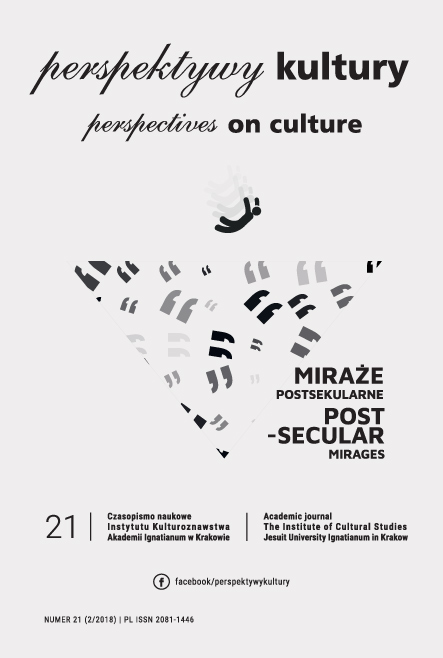Post-secular philosophy. Between theory and ideology
Abstract
This text is devoted to showing that from the point of view of the tasks of science dealing with the description and explanation of the different aspects of religion, the post secular turn is only apparent. Its ostensi bleness lies in the fact that the program articulated by post-secular phi losophers suffers from a number of defects. Their accumulation leads to the conclusion that the post secular paradigm has never existed even as the seed of a theory of religious phenomena, but it has some of the characteristics of an ideology.
This article reconstructs subjects key philosophical positions asso ciated with the post secular turn (Philip Blond, Gianni Vattimo, John D. Caputo, Jürgen Habermas) to critical analysis in an effort to extract the relevant properties of post secular philosophy to indicate major de ficiencies. Next, I deal with the most important issue emerging from this analysis, namely, the question adopted by the post secular philoso phers of religion. In the last part I formulate conclusions regarding the applicability of post secular philosophy as a theoretical tool explaining the situation of religion in the post-modern world.
References
ARESHIDZE Giorgi 2017. “Taking Religion Seriously? Habermas on Re ligious Translation and Cooperative Learning in Post-secular Society”, American Policital Science Review vol. 4/111: 1-14.
ARFI Badredine. 2014. “Habermas and the aporia of translating religion in democracy”, European Journal of Social Theory 4/18: 489-506.
Augustinus Hipponensis, Tract. Iohann, W Patrologia Latina 35. AUGUSTYN. 1987. Wyznania, tłum. Z. Kubiak, Warszawa: PAX.
BADER Veit 2012. “Post-secularism or liberal-democratic constitutiona lism?”, Erasmus Law Review” 5/5: 5-26.
BIELIK-ROBSON Agata. 2013 Deus otiosus, W Deus otiosus. Nowoczesność w perspektywie postsekularnej, A. Bielik-Robson, Maciej A. Sosnowski (red.), Warszawa: Wydawnictwo Krytyki Politycznej.
BLOND Philip. 1997. Introduction: Theology before philosophy, W Post-
-Secular Philosophy. Between philosophy and theology, P. Blond (ed.), 1-66. London-New York: Routledge,
CAPUTO JOHN D. 2001. On Religion, London: Routledge.
DERRIDA Jacques. 1999. Wiara i wiedza, W: Religia: seminarium na Capri prowadzone przez Jacquesa Derridę i Gianniego Vattimo, tłum. M. Kowalska i in., Warszawa: Aletheia.
DERRIDA Jacques. VATTIMO Gianni. 1999. Religia: seminarium na Capri prowadzone przez Jacquesa Derridę i Gianniego Vattimo, tłum. M. Kowal ska, Warszawa: Aletheia.
HABERMAS Jürgen, 2012. Religia w sferze publicznej. Poznawcze założenia
„publicznego czyniania użytku z rozumu” przez obywatelni wierzących i niewierzących, W: J. Habermas, Między naturalizmem a religią, Warsza wa: Państwowe Wydawnictwo Naukowe.
HABERMAS Jürgen, TAYLOR Charles. 2011. Dialogue, W: The Power of Re- ligion in the Public Sphere, ed. E. Mendieta, J. VanAntwerpen, New York: Columbia UP.
HABERMAS Jürgen. 2002. „Wierzyć i wiedzieć”, tłum. M. Łukasiewicz, Znak 568: 8-21.
HEGEL Georg Wilhelm Friedrich. 1968. Glauben und Wissen, W: Hegel Ge- sammelte Werke Bd. 4, H. Buchner, O. Poeggeler (hrsg.), Hamburg: Mei ner Verlag.
HEIDEGGER Martin. 2011. Identyczność i różnica, tłum. J. Mizera, Warsza wa: Aletheia.
MARION Jean-Luc. 1996. Bóg bez bycia, tłum. M. Frankiewicz, Kraków 1996.
PARMAKSIZ Umut, “Making Sense of the Postsekular”, European Jounral of Social Theory 1/21: 1-19.
RORTY Richard. 2010, Antyklerykalizm i ateizm, W: Przyszłość religii, R. Roty,
G. Vattimo (red.) Kraków 2010.
SCHILBRACK Kevin. 2014. Philosophy and the Study of Religions. A Manife- sto, Chichester: Wiley Blackwell.
SCHOLEM Gershom. 2007. Mistycyzm żydowski i jego główne kierunki, przeł.
I. Kania, Warszawa: Aletheia. TOMASZ Z AKWINU. Summa theologiae.
VATTIMO Gianni. 1999. Belief, Stanford: Stanford UP.
VATTIMO Gianni. 1999. Ślad śladu, W: Religia: seminarium na Capri prowa- dzone przez Jacquesa Derridę i Gianniego Vattimo, tłum. M. Kowalska i in., Warszawa: Aletheia.
VATTIMO Gianni. 2002. After Christianity, New York: Columbia UP.
Copyright (c) 2018 Jesuit University Ignatianum in Krakow

This work is licensed under a Creative Commons Attribution-NoDerivatives 4.0 International License.
Autor, zgłaszając swój artykuł, wyraża zgodę na korzystanie przez Wydawnictwo Uniwersystet Ignatianum z utworu na następujących polach eksploatacji:
- utrwalania utworu w formie papierowej, a także na nośniku cyfrowym lub magnetycznym;
- zwielokrotnienia utworu dowolną techniką, bez ograniczenia ilości wydań i liczby egzemplarzy;
- rozpowszechniania utworu i jego zwielokrotnionych egzemplarzy na jakimkolwiek nośniku, w tym wprowadzenia do obrotu, sprzedaży, użyczenia, najmu;
- wprowadzenia utworu do pamięci komputera;
- rozpowszechniania utworu w sieciach informatycznych, w tym w sieci Internet;
- publicznego wykonania, wystawienia, wyświetlenia, odtworzenia oraz nadawania i reemitowania, a także publicznego udostępniania utworu w taki sposób, aby każdy mógł mieć do niego dostęp w miejscu i czasie przez siebie wybranym.
Wydawca zobowiązuje się szanować osobiste prawa autorskie do utworu.





